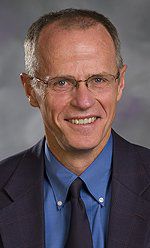Joe Peterson, vice president for Instruction at Salt Lake Community College, was named chancellor today of the newly formed Utah State University-College of Eastern Utah. His appointment begins July 1, the date on which the merger becomes official.
USU President Stan L. Albrecht said Peterson is extremely well qualified to lead the institution as CEU and USU combine to serve the students of the region and the communities themselves.
“Dr. Peterson is a native of the area with proven leadership skills at higher education institutions around the state,” Albrecht said. “He recognizes the distinctive strengths of both our institutions, and he has spent his professional life focusing on the needs of students. He will make an exceptional leader as we move to fulfill our land-grant mission to provide high-quality education throughout the state.”
Peterson began his career in 1982 as an instructor of English at USU. He went on to Dixie State College as a faculty member prior to becoming dean of Arts, Letters and Science at Dixie. He then became interim academic vice president and vice president of Student Services at Dixie before taking on his current duties at SLCC. He received a doctorate in educational leadership from the University of Nevada, a master’s degree in English from Brigham Young University as well as a bachelor’s degree in English from BYU.
Peterson said he is optimistic as the two institutions combine. CEU’s regional community college functions that served the community so well for so long now will be combined with the strengths of a major research university. “This will have a transformative impact of the region and will really provide a combination that meets the community’s needs,” he said.
He said he has been impressed with people both on and off campus as he traveled the region.
“People on campus show tremendous dedication to education of their students, and people off campus made clear that these campuses are vital to the health of the community,” Peterson said. “I am really pleased about how strongly the communities value what is going on there and how positive they are about the next phase.”
In addition to the Price campus, CEU operates the San Juan Campus in Blanding that enrolls more than 500 students, more than half of whom are Native Americans. This campus provides educational opportunities for students living in the southeastern portion of the state and offers a wide range of educational options. The San Juan Campus and USU’s Moab Education Center have enjoyed decades of cooperative educational offerings.
Peterson said he also is excited about the opportunity on a personal level.
“I was born in San Juan County and grew up in Carbon County,” he said. “My wife was born in Carbon and grew up in San Juan County, and we both have deep love for the region. This feels like coming home to a place we know and love well.
This first chancellor selection was made by Albrecht, the chairman of Utah’s Board of Regents, Jed Pitcher, and Utah’s Commissioner of Higher Education, William A. Sederburg. Peterson will report directly to USU President Stan L. Albrecht. In the future, the position will be appointed by USU’s president.
The search committee was composed of Greg Benson, vice president of Academic Affairs, College of Eastern Utah; Guy Denton, vice provost, College of Eastern Utah-San Juan Campus; Cameron Martin, associate commissioner for Economic Development and Planning, Utah System of Higher Education; Sydney Peterson, chief of staff, USU; Gary Straquadine, dean and executive director, USU-Tooele Campus; and Jan Young, director of Academic Records and Registration, CEU.
Between its 12-acre campus in Price and the San Juan Campus, CEU enrolls 2,173 students. Now in its 72nd year, it offers more than 400 courses in 60 areas of study with a faculty and staff of 230. Ninety percent of the courses are taught by full-time professors.
Peterson named first USU-CEU chancellor

"Joe Peterson, vice president for Instruction at Salt Lake Community College, was named chancellor today of the newly formed Utah State University-College of Eastern Utah."
